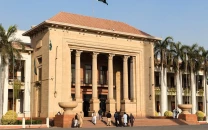Strategic changes: ‘Pakistan has complex issues due to climate change’
Diversified, durable climate resistant crops, upstream water reservoirs proposed at seminar.

"The policy needs to be decentralized as people at the grassroots level are the most affected by climate change," says Marius Keller. PHOTO: FILE
“We have suggested building several upstream water reservoirs in Pakistan to prevent floods. We are also examining reforestation as it slows down the process of floods and subsequent droughts,” Marius Keller, an adaptation consultant with the International Institute of Sustainable Development, said speaking to Lahore University of Management Sciences students on Monday.
Keller presented an overview of climate change, examining its impact on economy, poverty and development in several countries. He stressed the need for an enabling environment where government and research institutes could work together towards adapting climate resilient measures.
Keller said that in the last 20 years 140 climate-change triggered events in Pakistan had lead to an average of 500 deaths every year and a loss of $200 million to the country’s economy. He added that in the last 120 years, the average temperature had risen by 2 degrees Celsius globally. He said the temperature in Pakistan had risen by 0.57 degrees Celsius. He added that the sea level had risen by 1.2mm annually and would likely be up by 40mm in 2100.
Keller has been invited by Lead Pakistan to aid the Ministry of Climate Change in devising a national level implementation plan. He said his main objective was to integrate climate change development in a peaceful manner to help people adapt well. He said his team would also assess the climate vulnerability of semi-arid areas.
“Since Pakistan has a very complex geographical terrain, it also has complex issues arising due to climate change.” He added that the ministry had asked for assistance in the areas of food and water security. “But they place even higher importance on attaining sustainable energy.”
He said they had proposed more diversified and durable climate resilient crops which are less dependent on water. “Design systems have been suggested that are robust in more ways than one.” He explained this idea further saying that dams could be built not to certain capacity but to adjust to extreme weather conditions.
Keller said that the national climate change policy was a good stepping stone but no good would come of it until the provinces were engaged. “The policy needs to be decentralised ... as people at the grassroots level are the most affected by climate change.”
He said Pakistan needed to figure out key projects and prioritise those. He said it was of utmost importance to bring all stakeholders on board for a project. He said the IISD involved stakeholders from day one. He added that recently they had had a scoping session with the key ministries in Islamabad.
Event moderator Rafay Alam announced a LUMS climate change project in collaboration with the Worldwide Fund for Nature-Pakistan. He said students and researchers were observing meteorological data of eight districts in the Punjab and Sindh to note changes in weather patterns and the ways in which local farmers adapted to those changes.
“It will be a good baseline study for future reference.”
Published in The Express Tribune, April 24th, 2013.



















COMMENTS
Comments are moderated and generally will be posted if they are on-topic and not abusive.
For more information, please see our Comments FAQ